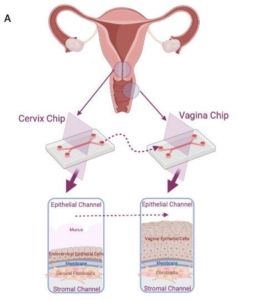
Understanding Vaginal Microbiome Dynamics with Organ Chips
Dysbiotic Vaginal Complications: Insights from Human Vagina and Cervix Chips Co-culture
Researchers used Organ-on-a-Chip technology to investigate the impact of cervicovaginal mucus on dysbiotic vaginal conditions. The study, detailed in “Modulation of dysbiotic vaginal complications by cervical mucus revealed in linked human vagina and cervix chips by Gutzeit et al. (bioRxiv, 2023), highlights dysbiotic changes in the female genital microbiome and their links to various health issues. The study employed a microfluidic two-channel co-culture of a cervix chip and a vagina chip, revealing that cervical mucus collected from the cervix chip protected the vaginal epithelium on the vagina chip from inflammation and epithelial cell injury. Proteomic analysis identified potential diagnostic biomarkers or therapeutic targets for bacterial vaginosis. The research underscores the utility of organ chip technology in understanding female reproductive tract health and disease.

Notably, the wide range of cells, media, and coating reagents required for establishing the Organ Chips are available in Europe through CellSystems®:

